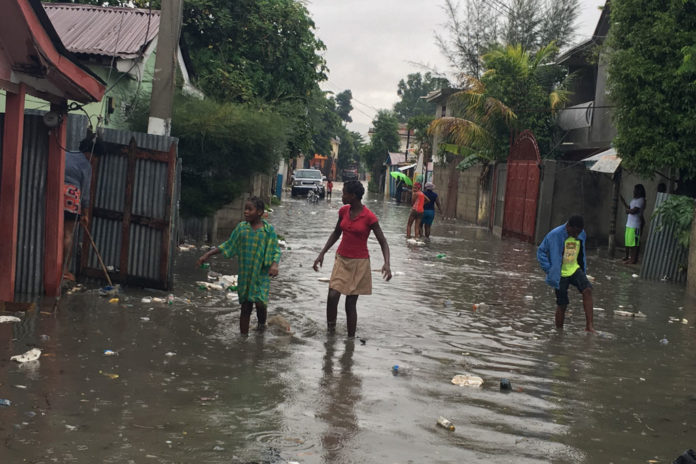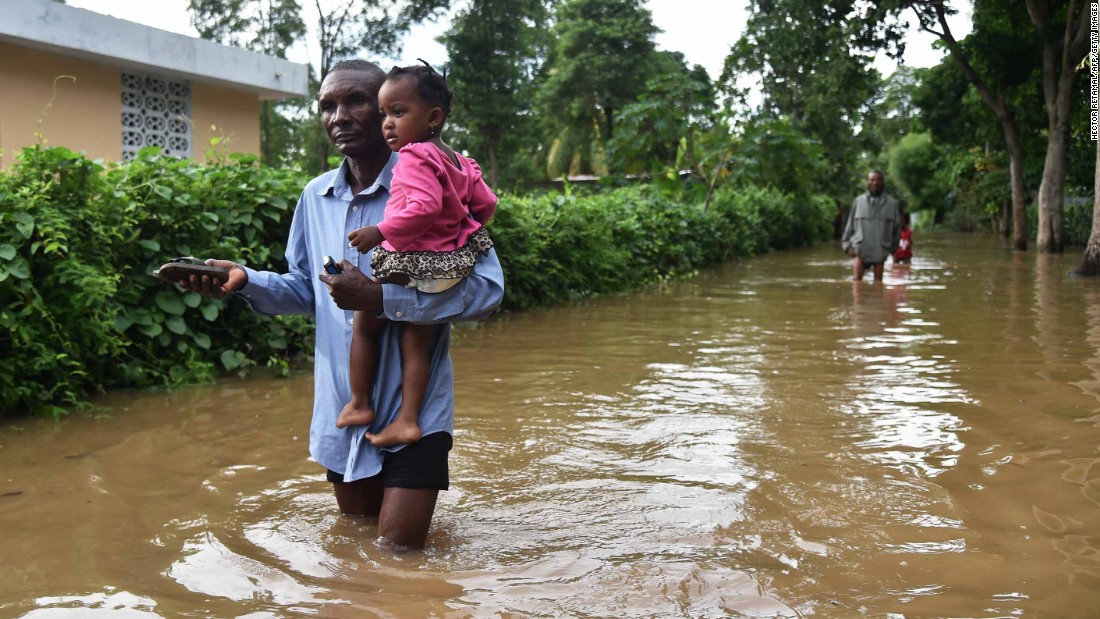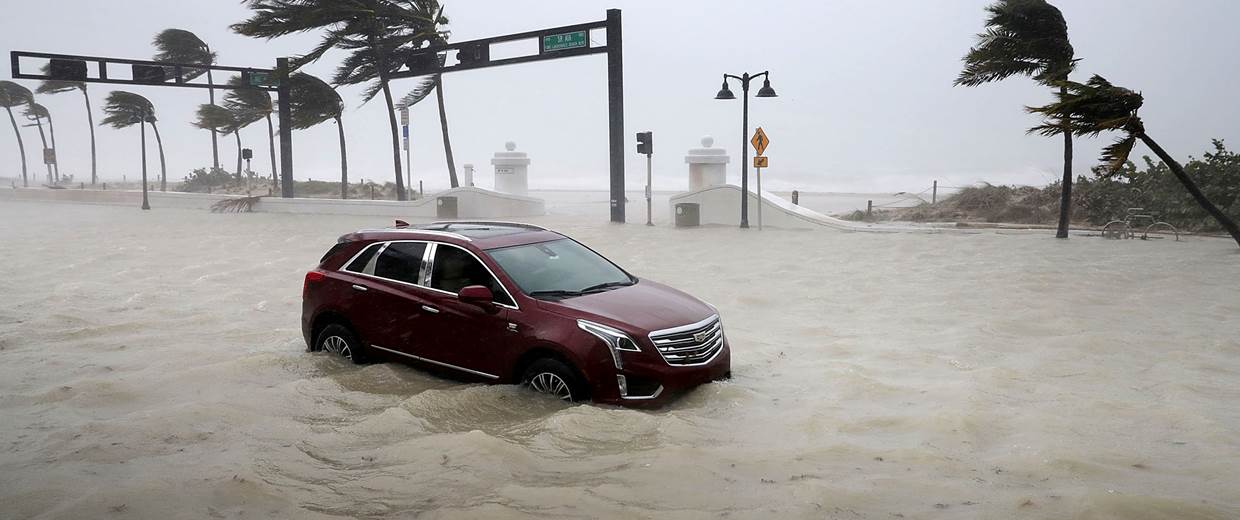
The following is an edited transcript of the interviews Haitian author Edwidge Danticat and Haïti Liberté journalist Kim Ives gave to the television program Democracy Now! on Sep. 11, 2017, just as Hurricane Irma was finally dissipating over Florida.
Danticat was reached by telephone, but the connection was lost halfway through her interview.
AMY GOODMAN: At least four people have died and nearly 6 million people are without power in Florida, after Hurricane Irma made landfall Sunday in the Florida Keys as a Category 4 hurricane. The storm also flooded the streets of downtown Miami, turning Miami’s main strip, Brickell Avenue, into a three-foot-high raging river. The storm sparked one of the largest mass evacuations in U.S. history, with nearly 7 million people ordered to leave their homes.
We go now to speak with one of them. We go to Florida to speak with the award-winning Haitian-American writer Edwidge Danticat. She lives in Miami but had to evacuate to Orlando.
Edwidge, how are you? Where are you now? And your thoughts on what’s taking place in your state?
EDWIDGE DANTICAT: Good morning, Amy. Thank you for checking in. I am fine. I’m doing much better than a lot of other Floridians. We had to evacuate on Thursday, because the area where I live is not too far from downtown Miami, and it’s close to a bay. And so we’re part of an extended evacuation area.
So we decided, actually, with two hours’ notice on Thursday, to drive up to Orlando, where we have friends. And the road was really – I’ve never seen anything like that. We were driving about 10 miles an hour most of the way because … we were among some of the 6 million or so people who were told to evacuate. So, it was a very long drive, with a lot of folks also leaving.
We got to Orlando, hoping for a weaker version of the storm… There is a lot of shortage of gas, so… we couldn’t clear the state totally. So we stayed in Orlando with some friends, where the storm did come last night in a weaker version. There was a lot of wind. And I’m not sure what the damage is out there now, because we haven’t been able to go out. We don’t have any power where I am, as most of something like 3 million Floridians don’t have power. But we’re OK. And we are happy to survive and are ready to return and see what happened, what we can do to help.
AMY GOODMAN:: I wanted to ask you about an issue that also plagued people as Hurricane Harvey was hitting Texas, where, in Houston, something like 85,000 young people have DACA status, are allowed to stay, live and work in this country, and in the midst of the horror of that hurricane, President Trump pulls DACA. I wanted to ask you about temporary protected status [TPS] for more than 50,000 Haitians. Their status was set to expire in July. But after pressure from immigrant rights activists, the Trump administration extended the temporary protected status for six months, meaning they could again face the threat of deportation in January. Are you hearing concern about this, as people are fleeing, as millions were forced to evacuate? Edwidge?
We may have just lost Edwidge Danticat, who was speaking to us from Orlando. She actually lives in Miami, but she is one of the 7 million evacuees in Florida.

But we are also joined in studio by Kim Ives. And it’s really important to talk not only what’s happened in the United States, but Hurricane Irma was the largest hurricane ever in the Atlantic. The death toll from Hurricane Irma has reached at least 27 in the Caribbean. The number is expected to rise as rescuers reach the hardest-hit areas. Irma destroyed major parts of several Caribbean islands, including Barbuda and Saint Martin. Cuba also suffered major flooding in Havana and other cities, but there were no reported deaths. [Cuba has since reported 7 deaths – HL]
The entrepreneur Richard Branson of Virgin Airlines, among other things, has called for a “Disaster Recovery Marshall Plan” for the Caribbean. Cuba has already sent more than 750 doctors and other health workers to Antigua, Barbuda, Saint Kitts, Nevis, Saint Lucia, the Bahamas, Dominica, and Haiti.
While Haiti avoided a direct hit from Irma, the hurricane still caused substantial damage in a country still recovering from the 2010 earthquake, as well as Hurricane Matthew last year. Irma displaced more than 100,000 Haitians and destroyed crops in the north of the country. So, Kim Ives joins Edwidge Danticat to talk not only about what’s happened in Florida, but what’s happened on the island of Haiti.
Kim, welcome to Democracy Now!
KIM IVES: Thanks, Amy. To the TPS question, you have about close to 60,000 Haitians who are facing deportation in January. This is really a triple whammy, because most of Haiti’s foreign exchange comes from remittances from people working in the U.S., so that’s going to be cut off. Then, they’re going to return to a country which is debilitated, not only since the earthquake, but since Hurricane Matthew. And thirdly, a lot of their homes were damaged in the flooding, in the winds that hit southern Florida. So, it’s a terrible situation for the Haitians in Florida.
But, for Haiti, it was also bad, because… 11 months ago, Oct. 4th, 2016, the country, the southern peninsula, was hit by a Category 4 hurricane. That was Matthew. And that destroyed… 85% of the corn, rice, sorghum, peas, millet, that comes out of that southern peninsula. That was wiped out. And 40% of the fruit comes out of that part of the country.

So it was the north that was picking up the slack, if you will. And that area has now been hit by Irma.
We should also say that the south had a three-year drought before the hurricane. So there’s this sort of climactic whiplash that’s happening. You’re going from drought to these floods. The new climate is so volatile, it’s really hurting a country like Haiti, which in the past six years has gone from the seventh to the third most climate-vulnerable country.
AMY GOODMAN: And so, while Haiti did not get a direct hit, because of its devastation, it is impacted in a way most people are not talking about. They’re just saying, “Oh, it was a miss for Haiti.”
KIM IVES: Right, exactly. But it’s a glancing blow, which was still devastating for farmers in the north. People had their crops wiped out by flooding and by wind. And it’s been just a terrible blow to a country which is already food-insecure.
AMY GOODMAN: Can you talk about the massive outbreak of cholera since the earthquake and how that fits in here with what’s happening now?
KIM IVES: Well, that’s the huge dilemma. Cholera was brought to the country by the United Nations occupation troops, which have occupied the country for the past 13 years. They came in after the 2004 coup d’état and were supposed to be there for six months. Now, 13 years later, they’re supposedly winding down to leave on October 15th. This is not the case. In fact, they’re just … replacing soldiers with policemen and women.
So, you have a cholera epidemic, the worst in the world, brought by Nepalese peacekeepers back in October 2010, seven years ago. And cholera, for those who don’t know, is a waterborne disease. It’s basically when sewage gets into your drinking water. So when you have this massive flooding, you’re definitely going to see a huge spike in cholera cases in Haiti.
AMY GOODMAN: And just to update us on the cholera case, when you talk about peacekeepers, you’re talking about UN peacekeepers.
KIM IVES: Yeah, quote-unquote “peacekeepers.”
AMY GOODMAN: And the latest on the responsibility the UN has taken for this massive outbreak? How many people died?
KIM IVES: It’s about a million who have been affected. Maybe 10,000 [misstated 100,000 on the air – HL] died. Those figures may be conservative, because a lot of people who do die are not registered…. The U.N. has taken no responsibility, essentially. They finally admitted last year that their response was not great, but Ban Ki-moon, when he was going out, made a sort of half-apology. But they have not given any reparations to Haiti… This has been taken to the courts here in New York City, but the courts keep saying the UN has immunity.
AMY GOODMAN: I want to go right now to the former UN Secretary-General Ban Ki-moon.
SECRETARY–GENERAL BAN KI-MOON: [translated] Let me, at the start, directly address the Haitian people. The United Nations deeply regrets the loss of life and suffering caused by the cholera outbreak in Haiti. On behalf of the United Nations, I want to say very clearly: We apologize to the Haitian people. We simply did not do enough with regard to the cholera outbreak and its spread in Haiti. We are profoundly sorry for our role.
AMY GOODMAN: “We are profoundly sorry for our role,” said Ban Ki-moon as he was leaving as UN secretary-general. As we wrap up, the significance of what he said and what he didn’t say, Kim?
KIM IVES: But stopping short of saying that it was UN troops that brought the cholera into Haiti. They’ve avoided this because, legally, they’ll be liable. But the Institute for Justice and Democracy in Haiti [IJDH] brought a suit, which has been rebuffed in the UN claim system and also rebuffed in the United States courts here [in New York].
AMY GOODMAN: And before we go, I was asking Edwidge Danticat before we lost her… The issue of TPS and Haitians both dealing with this terrible hurricane and having to leave? You have 10 seconds…
KIM IVES: Yeah, they’re going back. It’s close to 60,000 who will be sent back. And again, it’s a triple whammy. They lose the remittances. They lose their homes. And now they’re going to be sent back to Haiti, which is suffering food insecurity.
AMY GOODMAN: Unless President Trump changes his mind.
KIM IVES: Unless he changes his mind.









